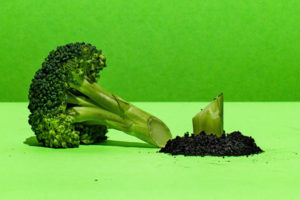These are heady times. Sure, things are not exactly rosy with the world – our environment is degrading at an accelerating rate; global warming is a major threat. But there are incipient signs that we might, just might be on the brink of turning things around. Most promising is the trend towards mindful eating. It’s growing stronger every day.
More and more people are choosing to eat low on the food chain. A recent British poll found that the number of vegans there has more than tripled in the last 10 years! Slashing our consumption of animal products is the easiest and pretty much the single most powerful action we can take to reduce our personal global warming footprints. Animal agriculture, as the United Nations Food and Agriculture Organization tells us, is responsible for a bigger fraction of global warming than all of transportation combined. The more influence those of us who know this can wield – the more people we can convince to act on this fact – the better the chance that we’ll avoid the worst of the catastrophes so many scientists are warning us about. This is an opportunity that we don’t want to waste.
With the state of the world – with so very much at stake – it is really important for the public to see those of us who follow a plant-based diet as credible.
But the unfortunate fact is that many people still don’t take the need to adopt a plant-based diet seriously. Likely, more often than not, rooted in a desire to eat as they always have, they look for an excuse to write off vegetarians and vegans as somehow deluded. It’s very important not to give them that excuse. We who eat plant-based diets must be seen as credible when we speak to the general public. It really hurts our cause when we combine our fact-based arguments with highly contentious claims.
Let’s take two examples. Both are related to what we put in our bodies: microwave ovens and alkaline water. Many among us have somehow become convinced that microwave ovens are extraordinarily dangerous. Others are sure that expensive alkaline water is something special – a health-promoter even. It is very surprising that people accept these arguments. For the fact is that microwave ovens are about as safe as regular ovens – and better for the environment. And alkaline water, while harmless enough, lacks any real advantage over the regular stuff.
Let’s start with microwaves. Comprising the electromagnetic spectrum (light) midway between radio and infrared (i.e., heat), – and a great deal less energetic than regular heat or even visible light – these waves heat food by causing molecules to vibrate. So does regular heat. There’s nothing particularly special in that. Temperature is vibration; the infrared light from an ordinary oven, or from a fire for that matter, causes molecules to vibrate just as fast. It is these vibrations that cook the food.
Microwave ovens are special – and better for the environment – because microwave energy is absorbed by a smaller number of molecules than is regular infrared heat (and, again, the two lie right next to each other on the electromagnetic spectrum, a bit less energetic than visible light). Unlike infrared, the air around the food doesn’t absorb microwaves, so it takes less energy to cook in a microwave oven than a regular oven does. This generally means fewer fossil fuels burned to produce electricity, a big advantage in the quest to stem global warming.
Some people worry about the magnetic field produced by these ovens. If there is a danger from this, it is tiny. Stovetop burners produce similarly strong magnetic fields, as do many blenders, even can openers. Microwave ovens are not exceptional that way. The magnetic field from the ignition coil in a car, though, is many times stronger. Cars, of course, with their carcinogen- and greenhouse gas-spewing exhausts, combined with the side-effects of moving tons of metal at high speed are a real danger to human and animal life.
Alkaline water is something else altogether. While harmless enough, it’s gained such a reputation in some quarters that some people are willing to spend thousands of dollars on machines to make it for them. What those expensive water ‘ionizer’ machines do is use electricity to convert dilute sodium chloride (salt) in the water into sodium hydroxide (lye) and hypochlorous acid (akin to bleach). The latter is generally siphoned off. This process is a colossal waste of money. You can make the same thing exactly by adding a tiny bit of lye to any water you choose. It’ll taste the same; it’ll have the same slippery feel. And it’ll cost you pennies for many years’ supply.
But even then, there’s not much point. The reason it is easy to make water alkaline is that water is not buffered. Adding a tiny amount of any base (e.g., lye) will shift the pH dramatically (look it up in any introductory chemistry book). That means that when you swallow the alkaline water, it’ll instantly convert to the pH of your strongly acidic stomach. Your body is not going to notice. The main way our bodies regulate pH is by controlling the amount of carbon dioxide dissolved in our blood – and it does so by regulating our rate of breathing. It’s an unconscious process. If the blood gets too acidic, we breathe a little faster; too alkaline, we breathe a little slower. Even if the pH of the water we drink did affect blood pH, it would be fast overwhelmed by our simple breathing. No need to waste money on that.
The fact is that our planet is in crisis. If we’re going to turn things around, people on plant-based diets need to be taken seriously by the general public. Disseminating misinformation about microwave ovens or alkaline water or the like detracts from our cause; it lowers the trust others have in our judgment. So, let’s stick to well-established facts when advising others to take on a more environmentally friendly diet. There’s so much at stake.
Photo by Smartworks Coworking on Unsplash




